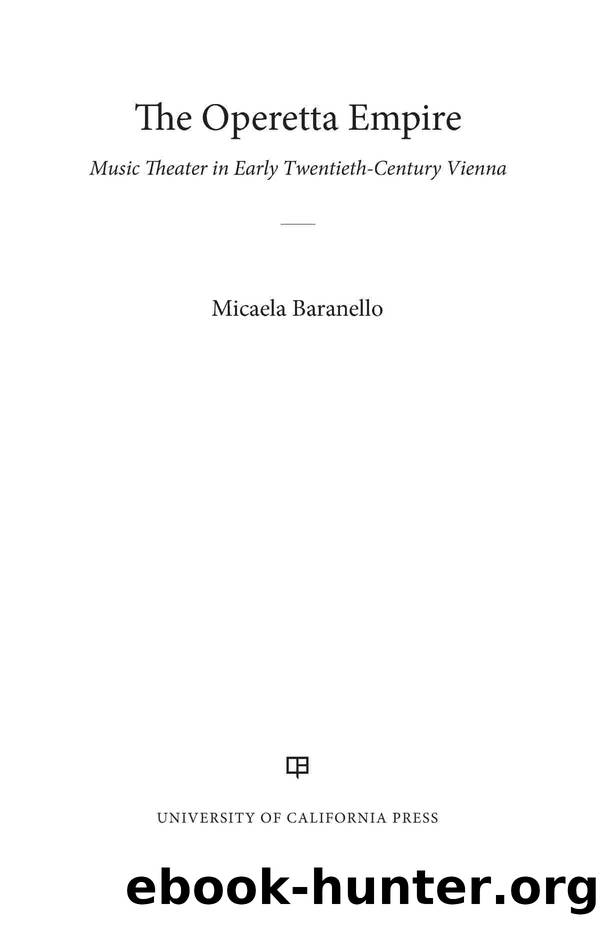The Operetta Empire: Music Theater in Early Twentieth-Century Vienna by Micaela Baranello

Author:Micaela Baranello [Baranello, Micaela]
Language: eng
Format: epub
Tags: history, Modern, 20th Century, Europe, Austria & Hungary, music, History & Criticism, Genres & Styles, Opera, Performing Arts, theater
ISBN: 9780520379121
Google: yAYjEAAAQBAJ
Publisher: Univ of California Press
Published: 2021-06-15T00:19:28.895522+00:00
OPERETTAâS EXOTICISM
Exoticism in Viennese operetta was not new, but, as already seen in Der Zigeunerprimas (chapter 3), it was not an easy fit for traditional musicological models. Typically, scholars interrogate the representation of the non-Western culture with regard to authenticity and consider the power relations involved.8 But the exotic realms of operetta composers and librettists are often explicitly marked as fake from the start. The division between East and West is ultimately revealed to be illusionary or unimportant; the main characters share a common humanity. âMy love and your love, theyâre the same, I love you and you love me, and that is all,â sing the Viennese Count Gustl and the Chinese princess Mi in Das Land des Lächelns. While exoticism is seemingly predicated on the notion of difference, in operetta that difference is frequently subverted. In his study Musical Exoticism: Images and Reflections, Ralph Locke argues for a âFull-Contextâ paradigm, which can find exoticism in moments lacking in many of the conventional musical markers of such.9 Analyzing operettaâs exoticism, however, requires something more like the opposite: one must suspect that not all that appears exotic actually is. Exoticism was an attraction but did not run so deep as to penetrate actorsâ customary star images, nor did a novel setting prove any impediment to operettaâs most conventional dramaturgical moves. Its deployment is partial, sometimes ambivalent, and often less than skin deep.
Operettaâs exotic spaces represent, more explicitly than in opera, psychological rather than physical zones. In this, operetta has much in common with other Austrian culture of its time, which, Robert Lemon has argued, often takes the form of self-critique, âinvoking the oriental âOtherâ not to bolster Occidental imperialism but rather to express concerns about their own troubled empire.â10 The East of Austrian literature, Lemon argues, is a relativistic place that is both East and West at once, located not in a distant colony but rather in the Austrian subjectâs own mind, and acts as a metaphor for Austro-Hungarian relations. Such is also the case in operetta. Many of these operettas transmit, at least at points, a message of universalism and tolerance perhaps typical of their Jewish creators.11 But they should not be mistaken for a transcultural experience. Exotic people appear within the norms of the genre, and usually in full recognition of their stagy fakeness.
Operetta exoticism followed the same fads of literature and film, and the plot-lines recall contemporaneous novels and films like The Sheik and The Prisoner of Zenda. The problems that afflict operettaâs foreign lands are often familiar. Many concern the role of women. Unlike opera, many prominent exotic operettas feature a Western woman paired with an exotic man, allowing librettos to explicitly engage with the role of women in European society.12 Just after the imperial house abruptly exited the public stage, most postwar exotic operettas conspicuously fixate on those exotic landsâ crises of succession. Their central conceit of a young heir struggling to modernize his outmoded state was thus both nostalgic and newly timely, now existing in an age when change in Austria was no longer hypothetical or optional.
Download
This site does not store any files on its server. We only index and link to content provided by other sites. Please contact the content providers to delete copyright contents if any and email us, we'll remove relevant links or contents immediately.
Kathy Andrews Collection by Kathy Andrews(11839)
The remains of the day by Kazuo Ishiguro(9002)
Spare by Prince Harry The Duke of Sussex(5200)
Paper Towns by Green John(5194)
The Body: A Guide for Occupants by Bill Bryson(5100)
Industrial Automation from Scratch: A hands-on guide to using sensors, actuators, PLCs, HMIs, and SCADA to automate industrial processes by Olushola Akande(5063)
Machine Learning at Scale with H2O by Gregory Keys | David Whiting(4314)
Be in a Treehouse by Pete Nelson(4055)
Never by Ken Follett(3960)
Harry Potter and the Goblet Of Fire by J.K. Rowling(3864)
Goodbye Paradise(3812)
The Remains of the Day by Kazuo Ishiguro(3414)
Into Thin Air by Jon Krakauer(3402)
Fairy Tale by Stephen King(3401)
The Cellar by Natasha Preston(3347)
The Genius of Japanese Carpentry by Azby Brown(3310)
120 Days of Sodom by Marquis de Sade(3276)
Reminders of Him: A Novel by Colleen Hoover(3122)
Drawing Shortcuts: Developing Quick Drawing Skills Using Today's Technology by Leggitt Jim(3084)
